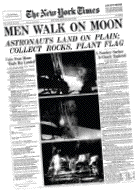
|
|||||||||||||||||||||||||||||||||||||||||||||||||||||
|
Is it news if it's not reported?
Yesterday Jeff Jarvis quoted a line from that piece. "The sources never got paid. So the news was always free, it was the reporting of it that cost." Which inspired a thread by two-time Pulitzer winner Howard Weaver, who I visited by train in Sacramento in June. In that thread Weaver said something that I couldn't respond to in a mere 140 characters. It was that good. Weaver: "Is it news if it's not reported? I don't think so." Weaver is the perfect foil because he says things like that. He's not wrong, given his background, where he spent his youth, his level of accomplishment, his justifiable pride, he has to think that. And equally, given all my experience, I have to think the other way. I blogged because there was news the press wasn't reporting. 4/5/97: "The press only knows three stories, Apple is dead, Microsoft is evil, and Java is the future." I understand this is a semantic debate. Weaver chooses to define news as what was reported. I choose to see news everywhere, that it exists before it is reported, that reporting isn't even a necessary part of the news. I see his view as the means by which the press controlled us, but that control is slipping. An example of the futility. I was shocked for about 20 seconds to hear that Sarah Palin had resigned as Alaska governor. It was news the instant she made the announcement. I had to rush out to a lunch meeting at the Jupiter in downtown Berkeley. When I got back, it slipped my mind that there was a "breaking story" I could watch on CNN. I noticed some bloggers talking about it. I thought to tune in for about 5 seconds, even got so far as locating the SlingPlayer icon on my desktop. But before I could click, I was already bored. At least for me, the reporters are as irrelevant as paper delivery of the NYT, WSJ and SJM had become in 1994. I know what they're going to say before they say it. I also don't feel their ability to set an agenda anymore. The only reason Palin has any viability is that the press remembers who she is. For me, and I'd bet a huge chunk of the electorate, she's a fading memory of an election we've put way behind us as we've turned to face our futures. For me the last election was only important in that it got Bush and the Republicans out. Having accomplished that, I don't care what the press thinks is news. I decide that for myself now. I guess that's the point I'd like to make in response to Howard's excellent quote. I decide what's news. I don't delegate that. Maybe others want to accept the filter of the press, that's their right. But I don't care what they think is news. It's not that I decided not to care, it's that I truly don't care. PS: To be clear, I do care what Weaver thinks is news. Perhaps that's the subject of another piece, or perhaps something to talk about on Monday's RTN. Update: Jeff Jarvis advances the discussion. On Twitter I just said I like the Perry White approach to news. Of course I meant Joe Friday of Dragnet. A witness would be gabbing opinions about stuff. Friday would humor her a bit and then the camera would focus on him with his notebook and he would say his famous line. "Just the facts, ma'am."
|
"The protoblogger." - NY Times.
"The father of modern-day content distribution." - PC World.
One of BusinessWeek's 25 Most Influential People on the Web. "Helped popularize blogging, podcasting and RSS." - Time.
"The father of blogging and RSS." - BBC.
"RSS was born in 1997 out of the confluence of Dave Winer's 'Really Simple Syndication' technology, used to push out blog updates, and Netscape's 'Rich Site Summary', which allowed users to create custom Netscape home pages with regularly updated data flows." - Tim O'Reilly.
My most recent trivia on Twitter. On This Day In: 2008 2007 2006 2005 2004 2003 2002 2001 2000 1999 1998 1997. |
||||||||||||||||||||||||||||||||||||||||||||||||||||
|
© Copyright 1997-2009 Dave Winer. Previous / Next |
|||||||||||||||||||||||||||||||||||||||||||||||||||||



